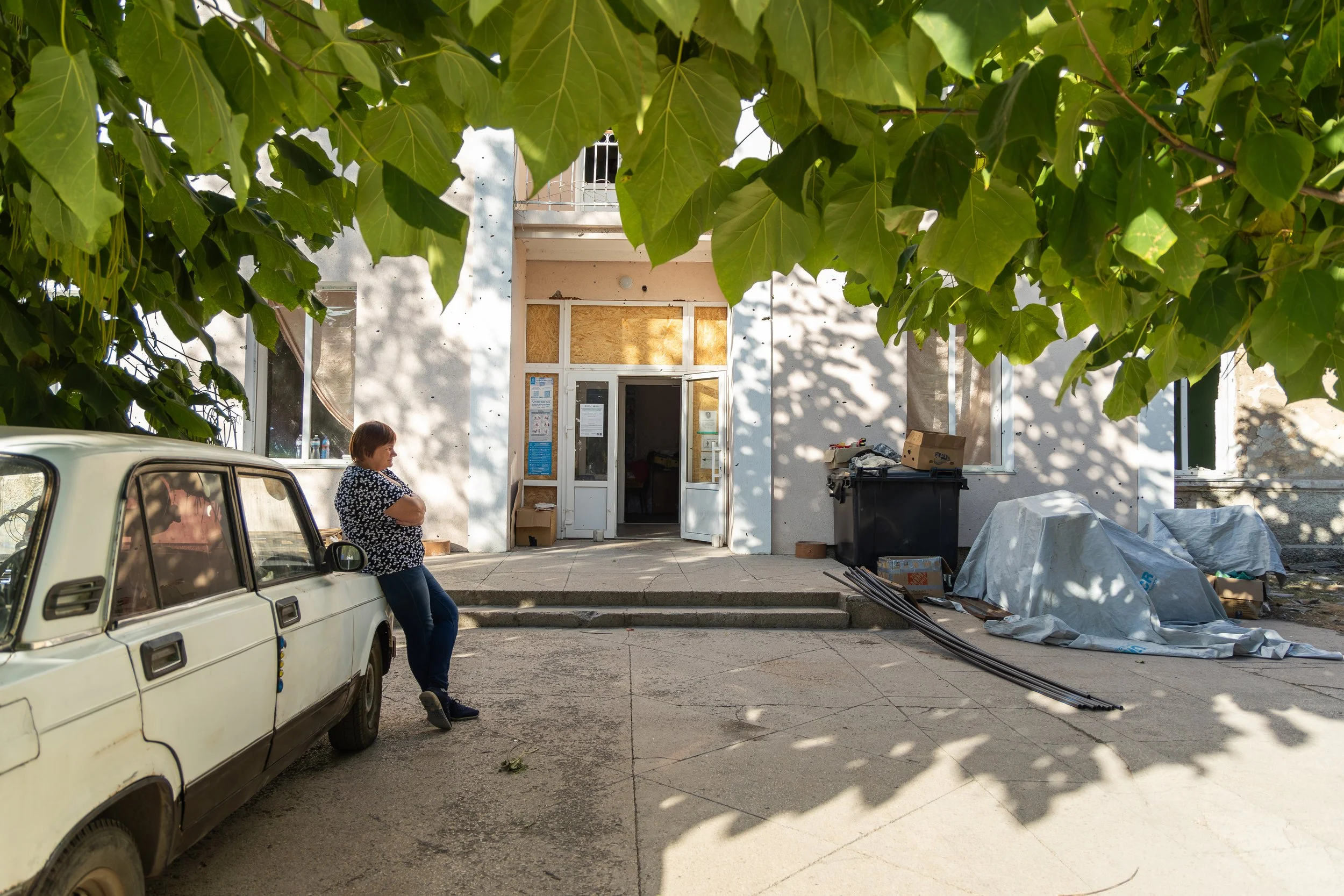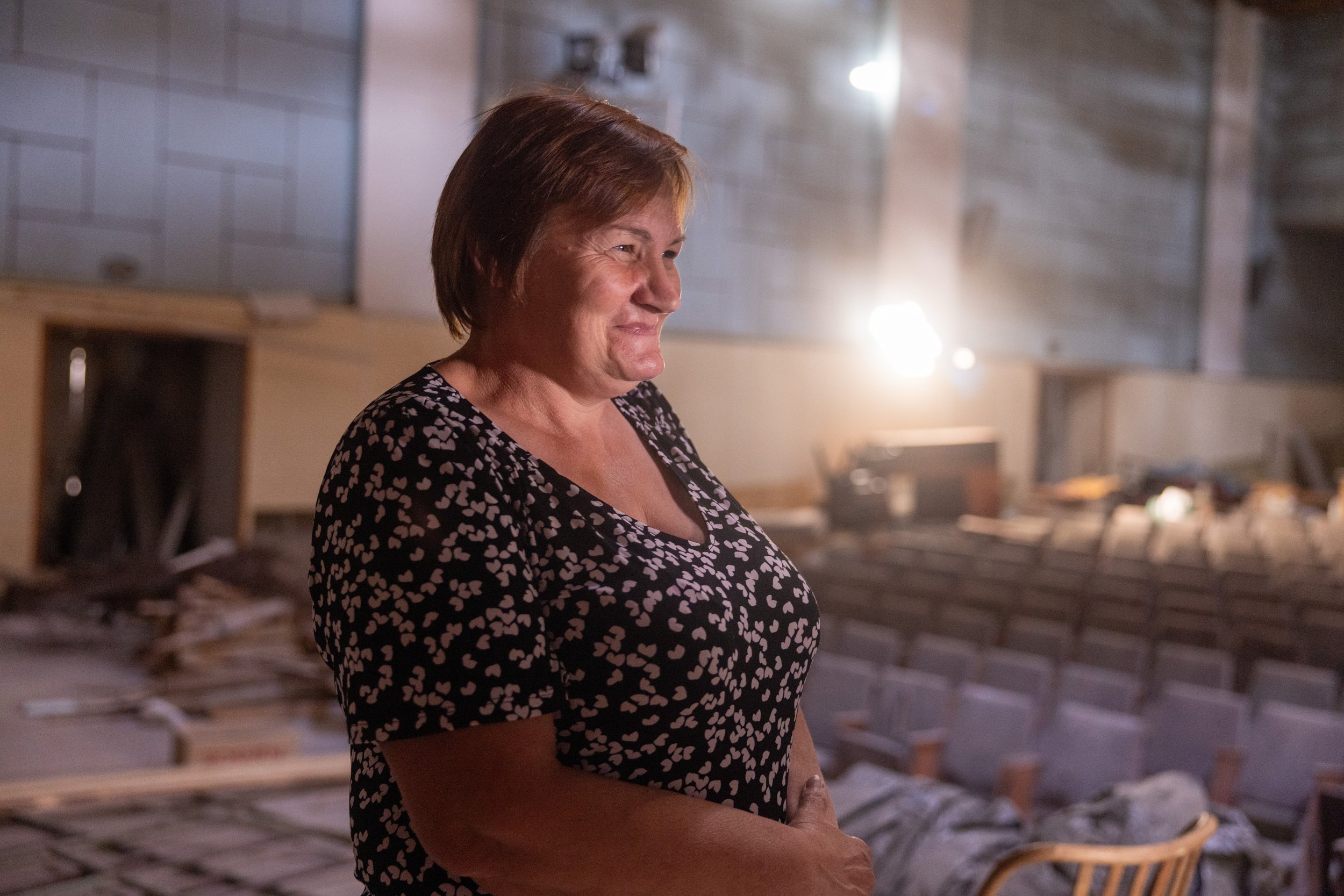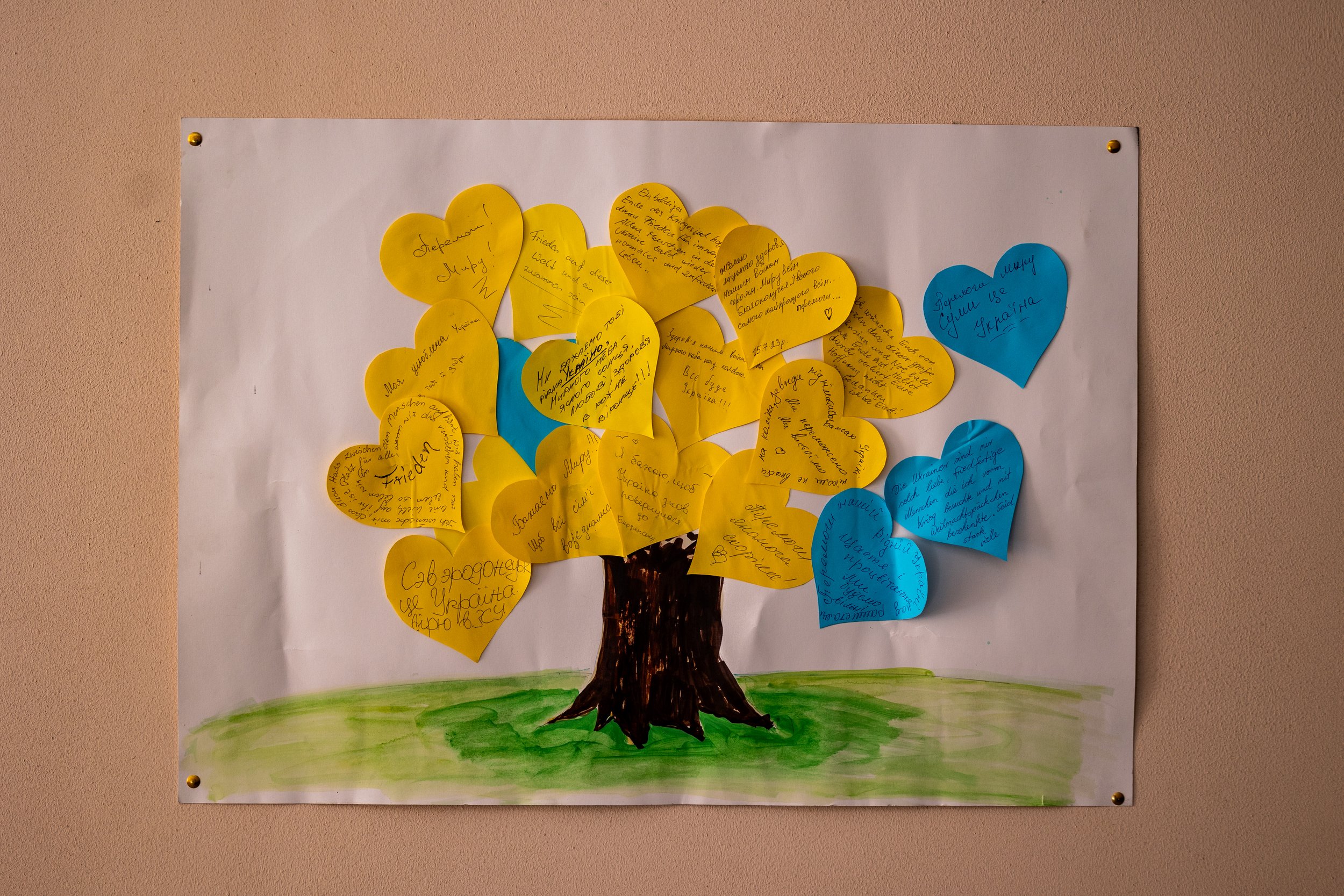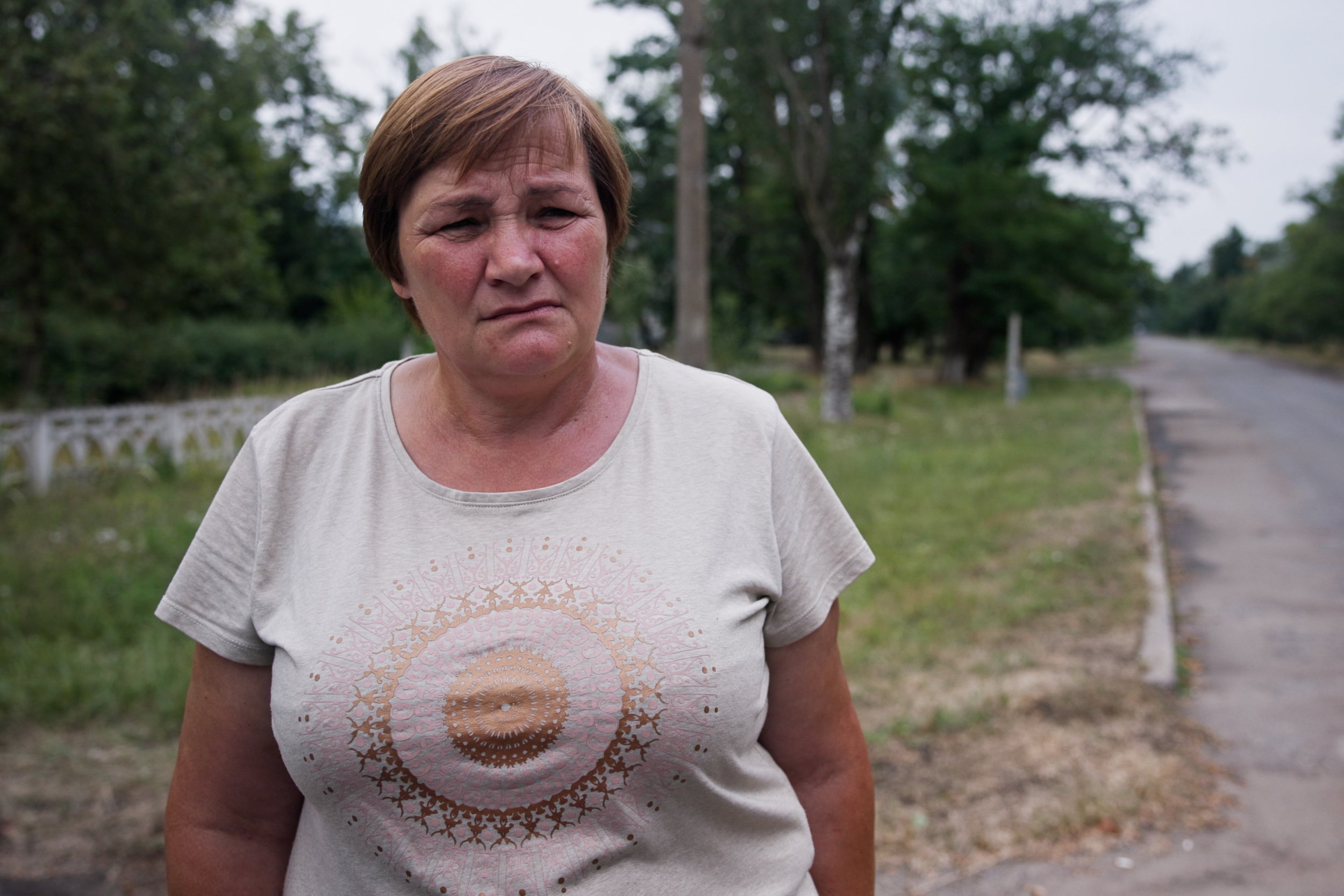
‘Do you think people will come back?’
‘Yes. They will come back. We will rebuild everything: the schools, the kindergartens, the Palace of Culture. Music will be played; the concerts performed. And we will live as we lived before war. We will rebuild and we will live even better than before.’
The Palace of Culture
One woman’s fight in no-man’s land
Words: Louis Hall | Photographs: Zach Tarrant
We arrived at the village of Luch. It was a metal-grey November morning. Along with Zach (photographer) and Yasha (translator), I stepped out of the car and found myself on a silent street of detached buildings. Most of the two and three-story structures were either half or entirely razed to the ground. The ones that remained standing had black holes for windows and tin barricades for doors. Three dogs passed by along the potholed road.
48 kilometres north of the Kherson front line and 32 kilometres south of the city of Mykolaiv, Luch lies in a sort of tundra; a desolate, liberated space defined by the scars that made it so. In this tundra 210 people still live. Young and old. Residents who, before 24th February 2022, lived in a village proud of their primary school, nursery and football team; a village that boasted a 400-seater theatre with a grand piano; a Palace of Culture for art, dancing and music; an orphanage with dormitories, a canteen and playgrounds.
Houses belonging to the remaining 210 civilians.
In the early stages of the invasion, the Russians advanced up fast through the Kherson region. With all intentions set upon the capture of prized Mykolaiv, Luch became a violent battleground and, as it materialised, an immoveable force. After being under siege for almost every day for eight months, the village held fast. The Ukrainian forces pushed back the Russian advance in a rapid counterattack in the autumn of 2022, culminating in the recapture of Kherson. In their efforts, many of the original Luch residents were killed. Others were evacuated by volunteers.
One woman stayed throughout. Her name is Svitlana.
Svitlana, sixty-two years old, greets us outside the glassless doors of the Palace of Culture. Once a hub for the community, the vast, five-story structure has taken on the appearance of a fortress.
‘Don’t worry about the dogs, they come and go as they please.’
I shake her hand. She has short cropped hair, marble brown eyes and holds herself with an air of pragmatism. She leads us inside.
In the entrance hall the walls are a cream yellow, and the ceiling is high. At the far end there is a painting of a blue mountain with deer running up the side of it, chasing each other towards the sky it seems. Birds are in flight above them, migrating, while two chestnut horses, a mare and a foal, crop the light green grass in the foreground. Pushed up against the side walls are the remnants of humanitarian efforts: water bottles, plastic cups, kettles, torches, first aid kits, plastic bags of clothes.
Svitlana waiting outside of the Palace of Culture
We follow Svitlana through a makeshift plywood door at the back of the hall. The theatre. Row upon row of seats are hunched up together, covered in a coat of dust. A plume of flickering light pours down from a gaping hole in the back-left corner of the ceiling – the work of a Russian missile. A blue sheet of tarpaulin has been stretched from rafter to rafter in a bid to keep out the worst of the rain.
Svitlana walks up the stairs onto the stage where a red velvet curtain is pulled across with a giant, yellow ‘30’ hanging down in front of it. Made from card, white doves are clinging to the blue-coloured numbers. We grab two seats form the wings and, with the help of Yasha, sit down to talk.
‘When it was announced that the Russians were coming there were some people who did not believe it. They laughed. Immediately I began to prepare two shelters underground. The people stopped laughing on 27th February when the first of the shelling began. From February until November, one year ago now, we had very hard battles. We had no gas, no electricity and had to collect water from the reservoir. Only in April did we receive generators from volunteers.’
Svitlana pauses, makes herself more comfortable in her seat and then squints at the ground, as if remembering something. She is wearing denim jeans and a black t-shirt patterned with butterflies.
‘At the beginning we were able to leave the shelters each morning to help the people still in their homes. We would put out the fires and keep them alive. We never risked moving in big groups, always small. But then it became almost impossible. In April, Number 10 was hit. Inside there were many elderlies. I do not know how the babushkas stayed alive after such an attack. The Russians came so close that they shot at my husband and my sons, Pasha, Andrii and Fedya. They were carrying the babushkas to the bomb shelter and the shelling was falling all around them. Eventually, by the end of May, volunteers came to evacuate the shelters. By that time there were 90 people in each. Once they had all gone, I moved into one of the shelters to live there permanently. And then, the shelling was round the clock. On 15th May I was wounded. I remember that day well.’
A breeze shakes the tarpaulin. We all look to the back of the theatre.
‘We used to have performances here...’ says Svitlana, quietly, looking out over the empty seats.
‘What were the performances like?’
‘Before the fighting we didn’t have empty seats. No… we never had empty seats. In the evening we heard children laugh. The elderly walked through the village or just gathered and sat together on the benches. The last time we had a performance was to celebrate 30 years of Independence. This is why the 30 hangs there behind me.’
‘What happened the day you were wounded?’
‘At that time, we mostly received canned food and cereals. But the day I was wounded we also received meat. A volunteer, Vitalya, called me on my phone to say that he had arrived, so I went out of the basement to meet him at his car. We unloaded and brought all the meat inside into the hallway of the Palace of Culture. It was then that the strong shelling started falling close to us. Too close. In a moment of silence, I ran across the road to the bomb shelter, shouting to Vitalya to leave the food behind. Vitalya didn’t come. He had dropped his radio set somewhere in the back of the storeroom and he ran to find it. And then I heard the sound of something flying through the air and then there was an explosion. The Palace of Culture was hit. Shrapnel went flying into my leg before I reached the shelter.’
How did it feel?’
‘Firstly, I didn't pay attention to it. I needed to go back to help Vitalya. I felt responsible for him - he had brought us food. I found him in the corner of the storeroom. He was safe. Before long, I looked around and saw blood spreading over the tiles of the floor. It was my blood.’
Svitlana assures us that her shrapnel wound has since healed. She laughs, pulling up the leg ofher jeans to her shin and pushing it back down again to assure us there is now only a scar. Her eyes sparkle in the light.
Here Svitlana and Vitalya escaped
‘And where are your family now?’
‘My husband is back from the fighting. He lives with me in the shelter. He can’t speak and has lost a lot of weight. Before he was violet colour, suffering from strong contusions. He is a little bit better now, but he still has this speechless fear. He helps me with rebuilding. Two of my sons are fighting. My youngest son is the mechanic. He has risked his life many times. He no longer lives with us in the dance hall, though, he has moved in with a girl in the village. They are expecting a baby.’
Svitlana shows us around the village. We meet the residents and visit the bomb shelters. We see the food store, the satellite tower and the school. In the orphanage there are children’s shoes and piles of teddy bears in the corners of rooms; the windows are shattered, with only jagged shapes of glass marking the empty space like teeth, and inside the paint droops from ceilings and walls like grotesque green tears. In the playground there is an unexploded missile impaled into the ground.
We say goodbye to Svitlana and drive back down the pot-holed road. After half a mile we turnright and head south towards Kherson. I look back and Luch has already disappeared behind thetrees, a home in the shadow of war. One thing always remains clear in Ukraine: what lies behindthe surface is what keeps this country alive.
































